WhyWeCraft: Cultural Sustainability Beehive
An immersive learning experience first hosted in Pocola commune, Țara Beiușului, Romania, where primary school students explore traditional craft practices passed down through generations, and, with the help of intellectual property know-how, discover their value and relevance for culturally sustainable fashion and textile production.
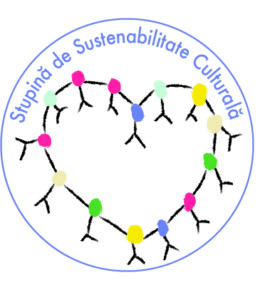
The creative journey begins with a profound connection to the local natural and cultural heritage, stimulating the conscious use of natural resources and traditional knowledge.

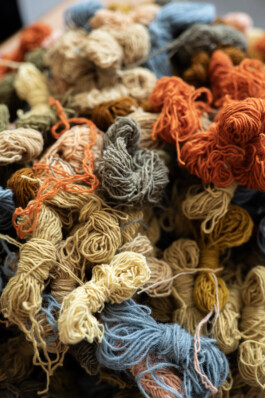
Biomimicking a bee colony
Students work collaboratively with local custodians of traditional knowledge and traditional cultural expressions to create culturally sustainable creations, learning to recognise, value and harness the power of collective creativity.
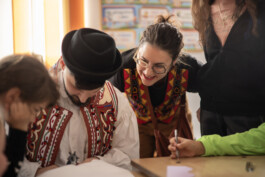

The Experience consisted of two immersive knowledge blocks: WEAVING AND LOCAL MATERIALITY and EMBROIDERY AND CULTURAL IDENTITY.
The final meeting concluded with the preparation and opening of the WhyWeCraft: Stupină de Sustenabilitate Culturală exhibition showcasing outcomes of the immersive learning experience.
The project used two core methodologies: localism, which recognizes the interdependence of human activities with the natural ecosystems and cultural nuances of a region, in this case Țara Beiușului, Romania, and multidisciplinary learning through immersiveness, a theory that is deeply impacting the future of learning and which applies to both learning by doing as well as learning while doing - the latter applied in relation to teaching children complex legal concepts such as what is and how to use Intellectual Property (IP) tools while immersed in creative processes.
Students learned how to recognise different raw materials and distinguish between wool and other types of yarns, what natural dyes can be obtained from different tinctorial plants, how to build themselves a weaving loom, they discussed the symbolism and importance of the Beiuș Sheepskin jacket (Cojocul Binșenesc) for their cultural identity, learned about the different IP tools such as copyright, industrial designs, trademarks, patents, and why are they important to textile and fashion production. Students and faciliators engaged in a collective design process creating the logo for the collective mark which was applied on all the creations in the exhibition and represents the new logo of Școala Primară nr. 1 Pocola.
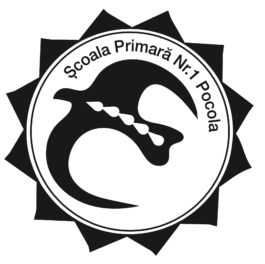
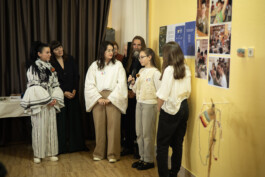
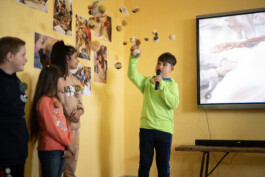
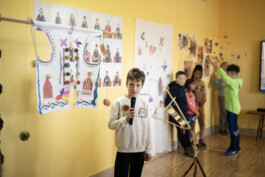
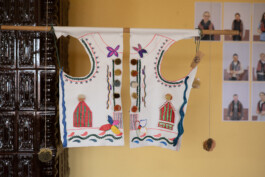
Exhibition Video
WhyWeCraft: Cultural Sustainability Beehive is a Learning Lab co-financed by the Creative Flip Learning Labs Program and Asociația WhyWeCraft, with the support of Goethe Institut Brussels.
Partners: Asociația WhyWeCraft and Școala Primară Nr. 1 Pocola
With the support of: Nalba Studio
Facilitators: Monica Boța Moisin, Lavinia Ghimbășan, Felicia Malița, Gabriela Cergheş, Patricia Dumea
Exhibition concept: Lavinia Ghimbǎşan - Nalba Studio
Foto video: Tudor Cioroiu - FormatFilm
We are deeply grateful to the local community in Pocola Commune, Țara Beiușului, Romania, and to all those who contributed with their time, energy, resources and active support to the realisation of the project.
Primǎria Pocola, Anton-Florin Boța, Răzvan Fericean, Ionuț Giurgi, Florin și Ana Jurcan, Radu Lazăr, Ioana Lavinia Leuce, Crina Popa, Diana Popa, Cristian Remus Țoța, Dumitru Vancu
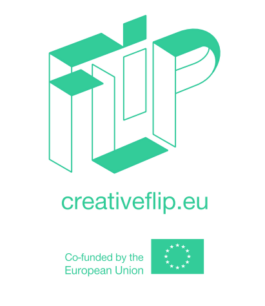
WhyWeCraft: Cultural Sustainability Beehive
An immersive learning experience first hosted in Pocola commune, Țara Beiușului, Romania, where primary school students explore traditional craft practices passed down through generations, and, with the help of intellectual property know-how, discover their value and relevance for culturally sustainable fashion and textile production.

The creative journey begins with a profound connection to the local natural and cultural heritage, stimulating the conscious use of natural resources and traditional knowledge.


Biomimicking a bee colony
Students work collaboratively with local custodians of traditional knowledge and traditional cultural expressions to create culturally sustainable creations, learning to recognise, value and harness the power of collective creativity.


The Experience consisted of two immersive knowledge blocks: WEAVING AND LOCAL MATERIALITY and EMBROIDERY AND CULTURAL IDENTITY.
The final meeting concluded with the preparation and opening of the WhyWeCraft: Stupină de Sustenabilitate Culturală exhibition showcasing outcomes of the immersive learning experience.
The project used two core methodologies: localism, which recognizes the interdependence of human activities with the natural ecosystems and cultural nuances of a region, in this case Țara Beiușului, Romania, and multidisciplinary learning through immersiveness, a theory that is deeply impacting the future of learning and which applies to both learning by doing as well as learning while doing - the latter applied in relation to teaching children complex legal concepts such as what is and how to use Intellectual Property (IP) tools while immersed in creative processes.
Students learned how to recognise different raw materials and distinguish between wool and other types of yarns, what natural dyes can be obtained from different tinctorial plants, how to build themselves a weaving loom, they discussed the symbolism and importance of the Beiuș Sheepskin jacket (Cojocul Binșenesc) for their cultural identity, learned about the different IP tools such as copyright, industrial designs, trademarks, patents, and why are they important to textile and fashion production. Students and faciliators engaged in a collective design process creating the logo for the collective mark which was applied on all the creations in the exhibition and represents the new logo of Școala Primară nr. 1 Pocola.





Exhibition Video
WhyWeCraft: Cultural Sustainability Beehive is a Learning Lab co-financed by the Creative Flip Learning Labs Program and Asociația WhyWeCraft, with the support of Goethe Institut Brussels.
Partners: Asociația WhyWeCraft and Școala Primară Nr. 1 Pocola
With the support of: Nalba Studio
Facilitators: Monica Boța Moisin, Lavinia Ghimbășan, Felicia Malița, Gabriela Cergheş, Patricia Dumea
Exhibition concept: Lavinia Ghimbǎşan - Nalba Studio
Foto video: Tudor Cioroiu - FormatFilm
We are deeply grateful to the local community in Pocola Commune, Țara Beiușului, Romania, and to all those who contributed with their time, energy, resources and active support to the realisation of the project.
Primǎria Pocola, Anton-Florin Boța, Răzvan Fericean, Ionuț Giurgi, Florin și Ana Jurcan, Radu Lazăr, Ioana Lavinia Leuce, Crina Popa, Diana Popa, Cristian Remus Țoța, Dumitru Vancu
